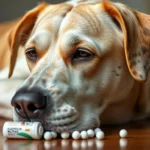
Ichthyosis is a genetic skin disorder that can significantly affect the health and well-being of golden retrievers. Understanding this condition is crucial for pet owners, as it can impact a dog’s quality of life. In this article, we will delve into the intricacies of ichthyosis in golden retrievers, exploring its symptoms, diagnosis, treatment options, and long-term management strategies.
Understanding Ichthyosis
Definition of Ichthyosis
Ichthyosis is a broad term that refers to a group of genetic skin disorders characterized by dry, scaly skin. The skin cells do not shed properly, leading to a buildup of dead skin that results in a rough texture. While ichthyosis can occur in humans, its manifestation in dogs is specific and varies by breed.
Ichthyosis in Dogs
When it comes to canines, ichthyosis in golden retrievers is particularly noteworthy. This breed has a genetic predisposition to this condition, which is inherited in an autosomal recessive pattern. This means that both parents must carry the gene for a puppy to be affected. Understanding the genetic background is crucial for breeders and owners, as it aids in making informed decisions about breeding practices and health management.
Symptoms of Ichthyosis in Golden Retrievers
Common Symptoms
The signs of ichthyosis in golden retrievers can be quite pronounced. Common visible symptoms include:
- Scaling and Flaking Skin: Affected dogs may have prominent flakes on their skin, particularly on areas such as the back, ears, and belly.
- Itchiness and Redness: Many dogs experience discomfort, leading to frequent scratching or rubbing against surfaces.
- Secondary Infections: The compromised skin barrier can make golden retrievers more susceptible to bacterial or fungal infections, which may exacerbate their symptoms.
Age of Onset
Symptoms of ichthyosis typically manifest within the first few months to a year of life. However, the severity can vary widely among individual dogs. Some may exhibit mild symptoms that require minimal management, while others may face more severe challenges that necessitate ongoing care.
Diagnosis of Ichthyosis
Veterinary Examination
If you suspect your golden retriever has ichthyosis, consulting a veterinarian is paramount. During a veterinary visit, the vet will conduct a thorough examination, reviewing the dog’s history and symptoms. This initial assessment is critical for determining the next steps in the diagnostic process.
Diagnostic Tests
To confirm a diagnosis of ichthyosis, several tests may be conducted:
- Skin Scrapings: This test helps identify any potential external parasites or other skin conditions that could mimic ichthyosis.
- Biopsies: A small sample of skin may be taken for histopathological examination, providing insights into the skin’s structure and condition.
- Genetic Testing: DNA testing can definitively confirm the presence of the gene responsible for ichthyosis, clarifying the diagnosis.
Differential Diagnosis
Several other skin conditions can present similarly to ichthyosis. Conditions such as seborrhea, allergies, or dermatitis must be ruled out to ensure an accurate diagnosis. This distinction is vital for effective treatment and management.
Treatment Options for Ichthyosis
Topical Treatments
Managing ichthyosis in golden retrievers often begins with topical treatments. Some recommended options include:
- Medicated Shampoos: These shampoos are formulated to help remove excess scales and soothe the skin. Look for products containing ingredients like salicylic acid or benzoyl peroxide.
- Conditioners: Moisturizing conditioners can help alleviate dryness and improve coat texture.
- Moisturizers and Emollients: Applying these can help maintain skin hydration and reduce scaling.
Medications
In addition to topical treatments, your veterinarian may prescribe medications, including:
- Anti-inflammatory Medications: These can help reduce itching and inflammation associated with ichthyosis.
- Antibiotics: If secondary infections occur, antibiotics may be necessary to treat the underlying issue.
Dietary Considerations
A balanced diet plays a critical role in skin health. Here are some dietary considerations:
- High-Quality Dog Food: Ensure that your golden retriever is fed a diet rich in omega fatty acids, which can promote healthy skin.
- Supplements: Omega-3 fatty acid supplements can be beneficial in managing symptoms of ichthyosis.
Long-Term Management of Ichthyosis
Regular Veterinary Check-Ups
Ongoing veterinary care is essential for dogs with ichthyosis. Regular check-ups allow for monitoring of the skin condition and adjustments to treatment plans as needed. Your vet will assess the effectiveness of the current management strategy and make recommendations for any necessary changes.
Home Care Practices
Home care is a vital component of managing ichthyosis in golden retrievers. Here are some tips:
- Daily Grooming: Regular brushing helps remove loose scales and keeps the coat healthy. Use a gentle brush designed for sensitive skin.
- Environmental Modifications: Keeping your dog in a humidified environment can help reduce skin dryness, particularly in winter months.
Supportive Therapies
In addition to conventional treatments, some supportive therapies may provide additional relief:
- Acupuncture: Some pet owners find that acupuncture can help alleviate discomfort and improve overall skin health.
- Herbal Treatments: Consult with a veterinarian knowledgeable in herbal remedies to explore possible options for managing skin conditions.
Preventive Measures
Responsible Breeding Practices
Preventing ichthyosis in golden retrievers starts with responsible breeding. Reputable breeders should conduct genetic testing to ensure that neither parent carries the gene associated with ichthyosis. By choosing a breeder who prioritizes health, you can help decrease the likelihood of genetic skin disorders in your future puppy.
Early Detection
Early detection of skin issues is crucial for effective management. Pet owners should regularly examine their dog’s skin and coat, looking for any signs of dryness, scaling, or discomfort. Prompt action can lead to more effective treatment and better outcomes.
Frequently Asked Questions (FAQs)
Is ichthyosis contagious?
No, ichthyosis is a genetic condition and cannot be transmitted from one dog to another. It is solely inherited through genetics.
Can ichthyosis be cured?
Currently, there is no cure for ichthyosis in dogs. However, with proper management and care, many dogs can lead comfortable lives.
What breeds are most affected by ichthyosis?
While ichthyosis can occur in various breeds, golden retrievers are particularly susceptible. Other breeds that may be affected include American bulldogs and some terrier breeds.
How can I help my golden retriever feel more comfortable?
To help your golden retriever manage ichthyosis, maintain a consistent grooming routine, provide a balanced diet rich in essential fatty acids, and follow your vet’s recommendations for treatment and care.
Conclusion
Understanding ichthyosis in golden retrievers is essential for pet owners to provide the best care possible. By recognizing the symptoms, seeking timely veterinary assistance, and implementing effective management strategies, you can enhance your dog’s quality of life. Awareness and education about this genetic skin condition are vital in ensuring that our furry companions remain happy and healthy.





